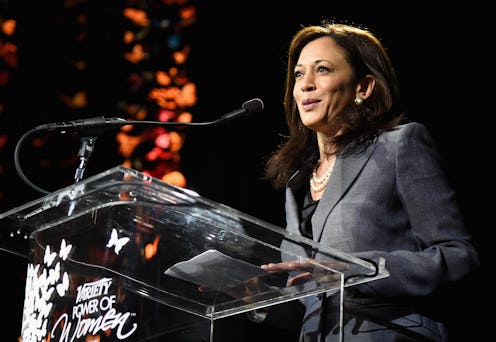News
Kamala Harris Believes Every Issue Is A Women's Issue

After a successful Senate campaign that earned endorsements from the likes of Barack Obama and Joe Biden, California Sen. Kamala Harris is quickly becoming a household name. Before winning her seat in 2016, Harris had a lengthy legal career: She served as attorney general for the state of California and, prior to that, as district attorney for San Francisco. As attorney general, she made headlines for refusing to defend Proposition 8, the anti-gay marriage law, and for winning a billion-dollar judgment against the for-profit Corinthian Colleges organization. Now, just two months since she's been serving in Washington, D.C., Harris has begun her Senate career by taking a strong stand against Trump's travel ban and introducing legislation that would give detained people access to lawyers.
But although she has covered a wide range of issues over her career in public, Harris believes they all have one thing in common. In an interview with Bustle, Harris stressed that from LGBT rights to false advertising and fraud to religious freedom, there's an underling current: "All issues are women's issues."
It's an idea that may seem a bit like a platitude at first, but as Harris explains it, is actually an important observation about the way Americans talk about identity politics. "I think it's important that we not relegate women to just one set of issues as though they aren't living full lives," Harris says.
That isn't to say that Harris doesn't support what most Americans typically consider to be "women's issues" — she's a full-throated supporter of Planned Parenthood and promised during her Senate campaign to make equal pay a reality. But Harris rejects the idea that women don't care just as much about apparently gender-neutral issues as they do about reproductive rights and sexism in the workplace.
This attitude is perhaps best encapsulated by the response Harris offers when people ask her to speak about women's issues. She says her go-to is usually, "I'm so glad you want to talk about the economy!"
For Harris, it is critical to emphasize how specific issues uniquely affect women, even if they aren't traditional "women's issues." With the economy, for example, Harris explains that "women are absolutely... concerned about their economic health and the economic health of their family. And that relates to the ability to be able to develop the skills to have meaningful employment, their ability to keep jobs, minimum wage, work site safety, issues that relate to being able to have affordable child care, family paid leave, and equal pay."
The economic example is especially important in light of the 2016 election. Narratives about economic decline in certain American communities frequently focus solely on the effect of that decline on men. The "angry white male" explanation for the election — that embittered, poor white men were responsible for Trump's victory — ignores the 53 percent of white women who also voted for Trump.
This doesn't mean, as Mark Lilla suggested in a New York Times editorial, that the party needs to let go of its trademark concern with identity politics. Identity, as Craig Mills at The Daily Beast argued in a response to Lilla's op-ed, "personalizes politics," and the Democratic Party's concern for the marginalized is one of the reasons many of its voters are loyal to it.
Yes, millions of women care very seriously about reproductive health care and family leave, but they also care about other things. No one would suggest that men care exclusively about access to prostate cancer screenings at the expense of the economy, so why would the reverse be true for women?
Harris' sentiments aren't a rejection of the importance of identity politics, or a call to eliminate them from the party agenda. One of her main objectives in the Senate, she tells Bustle, is to address those issues that require "loud voices on behalf of vulnerable people."
At the same time, however, Harris understands that women are perfectly capable of caring about many issues at once. When political conflict arises, she pictures a Venn diagram, independent circles that overlap in the middle. For example, women who disagree about abortion may have common ground with regard to maternity leave policy, or the economy, and so on. "There's usually an opportunity and an ability to expand that middle section, understanding that those three circles will never completely overlap," Harris said.
At a time when many Americans feel more divided than ever, Harris' message of relative unity may be the one the Democratic Party needs to regain control of Congress — or even, in a few years' time, the White House.